Anna Hyatt Huntington
| Anna Hyatt Huntington | |
|---|---|
 Anna Hyatt Huntington | |
| Born |
Anna Vaughn Hyatt March 10, 1876 Cambridge, Massachusetts |
| Died |
October 4, 1973 (aged 97) Redding, Connecticut |
| Nationality | American |
| Education | Art Students League of New York |
| Known for | Sculpture |
| Awards | Chevalier de la Légion d'honneur[1] |
Anna Vaughn Hyatt Huntington (March 10, 1876 – October 4, 1973) was an American sculptor and was once among New York City's most prominent sculptors. At a time when very few women were successful artists, she had a thriving career. She exhibited often, traveled widely, received critical acclaim at home and abroad, and won awards and commissions. During the first two decades of the 20th century, Hyatt Huntington became famous for her animal sculptures, which combine vivid emotional depth with skillful realism. In 1915, she created the first public monument in New York City, outside of Central Park, by a woman: Her Joan of Arc, located on Riverside Drive at 93rd Street, is also the city’s first monument dedicated to a historical woman.[2]
Life and career
Huntington was born in Cambridge, Massachusetts. Her father, Alpheus Hyatt, was a professor of paleontology and zoology at Harvard University and MIT, and served as a contributing factor to her early interest in animals and animal anatomy. Anna Hyatt first studied with Henry Hudson Kitson in Boston, who threw her out after she identified equine anatomical deficiencies in his work (Rubenstein 1990). Later she studied with Hermon Atkins MacNeil and Gutzon Borglum at the Art Students League of New York. In addition to these formal studies she spent many hours doing extensive study of animals in various zoos (including the Bronx Zoo)[3] and circuses. She was one of 250 sculptors who exhibited in the 3rd Sculpture International held at the Philadelphia Museum of Art in the summer of 1949.
In 1932, Huntington became one of the earliest woman artists to be elected to the American Academy of Arts and Letters.[4] Between the years of 1927 and 1937, Huntington developed and survived tuberculosis.
Huntington and her husband, Archer Milton Huntington, founded Brookgreen Gardens near Myrtle Beach, South Carolina. She was a member of the National Academy of Design and the National Sculpture Society and a donation of $100,000 from her and her husband made possible the NSS Exhibition of 1929. Because of her husband's enormous wealth and the shared interests of the couple, the Huntingtons were responsible for founding fourteen museums and four wildlife preserves. They also gifted Collis P. Huntington State Park, consisting of approximately 800 acres (3.2 km2) of land in Redding, Connecticut, to the State of Connecticut.
She was the aunt of the art historian A. Hyatt Mayor.
Death and legacy

Anna Vaughn Hyatt Huntington died October 4, 1973. She is buried in Woodlawn Cemetery, The Bronx, New York City,[5] next to her husband Archer Milton Huntington who preceded her in death on December 11, 1955.[6]
Her papers are held at Syracuse University,[7] and the Archives of American Art.[8]
The Metropolitan Museum of Art listed Huntington among the foremost woman sculptors in the United States to have undertake large, publicly commissioned works, alongside Malvina Hoffman and Evelyn Longman.[9]
Public equestrian monuments
Her animal sculptures, figures of both life-sized and in smaller proportions, are in museums and collections throughout the United States. Hyatt Huntington’s work is now displayed in many of New York’s leading institutions and outdoor spaces, including Columbia University, the Metropolitan Museum of Art, the National Academy of Design, the New-York Historical Society, the Hispanic Society of America, the Cathedral of Saint John the Divine, Central Park, Riverside Park and the Bronx Zoo.[2] She spent two years collaborating with Abastenia St. Leger Eberle to produce Man and Bull, which was exhibited at the St. Louis Exposition in 1904.
The Hispanic Society of America was founded in 1904 by her husband, Archie Huntington. Anna was responsible for the art in its courtyard,[10] including:
- the towering 1927 bronze statue, El Cid[11]—there are also editions in: Seville, Spain; Lincoln Park, San Francisco; Balboa Park, San Diego (El Cid Campeador); and Buenos Aires, Argentina
- the four bronze Castillian warriors around the El Cid statue,
- the bronze flagpole bases,
- the limestone bas-relief of Don Quixote, and
- the limestone bas-relief of Boabdil, the last Moorish king of Spain.
Two statues are located at the entrance to Collis P. Huntington State Park in Redding and Bethel, Connecticut: "Mother Bear and Cubs" and "Sculpture of Wolves". The park was donated to the state of Connecticut by the Huntingtons. Other equestrian statues by Huntington greet visitors to the entrance to Redding Elementary School, the John Read Middle School, and at the Mark Twain Library. The statue at the elementary school is called "Fighting Stallions" and the one at the middle school is called "A Tribute to the Workhorse". The sculpture at the Mark Twain Library, also called "The Torch Bearers" is identical in form to the one in Madrid, but is cast in bronze and appears to be smaller.
In her Horse Trainer (Balboa Park, San Diego) she enlivens the theme of the Roman marble Horse Tamers of the Quirinale, Rome, which had been taken up by Guillaume Coustou for the horses of Marly.
Huntington's Joan of Arc stands at the intersection of Riverside Drive and Ninety-third Street in Manhattan, with other versions in San Francisco, Blois, Gloucester, Massachusetts, and Québec City. The plaster model, which she made at the studio of Jules Dalou, earned her Honorable Mention at the 1910 Paris Salon. Cast in bronze by the Gorham Manufacturing Company to one-and-a-half-times life size, its Mohegan granite base was designed by John Vredenburgh Van Pelt; it contains fragments of the Rouen cell Joan was imprisoned in before her execution, and from Reims Cathedral. Jean Jules Jusserand spoke at its dedication on December 6, 1915. [12] The $35,000 needed to erect the statue was donated by numismatist J. Sanford Saltus, namesake of the American Numismatic Society's Saltus Award. [13]
- Andrew Jackson, A Boy of The Waxhaws, Andrew Jackson State Park, Lancaster, South Carolina, depicts a young Andy Jackson, sitting astride a farm horse. It is a bronze, larger-than-life statue. Usually her horses were noble, prancing, fierce beasts. She made Jackson's horse a gentler animal by fixing the energy and tension of the work on the figure of young Jackson. The sculpture was initiated by a letter from a sixth-grade class at Rice Elementary School in Lancaster, South Carolina, asking Mrs. Huntington if she would sculpt a statue of young Andrew Jackson for the state park. Mrs. Huntington submitted to do so, and replied, in part, "A picture came to mind as I read your letter and I have tried out the composition. I have Jackson as a young man of sixteen or seventeen seated bareback on a farm horse, one hand leaning on the horse's rump and looking over his native hills, to wonder what the future holds for him. He must have been a good looking and thoughtful boy, wondering what the future might hold, moments we all have from our teens to our nineties." The statue was completed at her Bethel, Connecticut studio, and was first worked in clay in half the scale of the final statue. Even then, it was necessary for the octogenarian sculptor to use a tall ladder to reach the top. South Carolina school children responded by donating their nickels and dimes to raise the necessary funds for a massive base to support the statue, which looks out over the large expanse of lawn at the park. County workmen placed the statue on its Lancaster County pink granite base in time for the ceremony marking Andrew Jackson's 200th birthday, in March 1967. This was Huntington's last major work, completed after her ninety-first birthday. The statue is located at Andrew Jackson State Park, about nine miles (14 km) north of Lancaster, South Carolina, just off US 521.
- General Israel Putnam, Putnam Memorial Park, Redding, Connecticut, commemorates General Putnam's escape from the British in 1779, when he rode down a cliff at Horseneck Heights in Greenwich, Connecticut. The statue is located at the intersection of Routes 58 and 107 at the entrance to Putnam Park.[14]
- Los Portadores de la Antorcha ("The Torch Bearers"), cast aluminum, Ciudad Universitaria Dental School, Madrid, was given to the people of Spain to symbolize the passing of the torch of Western civilization from age to youth; it was unveiled 15 May 1955.[15] At the time of its construction it was the largest statue in the world at 3,500 pounds (1,600 kg).[16] Replicas of the statue are on the grounds of:
- The Discovery Museum, Park Avenue in Bridgeport, Connecticut, one mile (1.6 km) south of Merritt Parkway Exit 47 Lindale Park, Houston;[17] cast bronze.
- The Mark Twain Library in Redding, Connecticut, cast bronze.
- The University of South Carolina's Wardlaw College at 33°59′48″N 81°01′50″W / 33.99679°N 81.03052°W; cast bronze.[18]
- Stevens Institute of Technology, Hoboken, New Jersey at 40°44′40.6″N 74°01′29.2″W / 40.744611°N 74.024778°W; cast aluminum, April 1964.
- The Chrysler Museum of Art, Norfolk, Virginia at 36°51′21.8″N 76°17′37.0″W / 36.856056°N 76.293611°W; cast aluminum, 1957.
- Statue of Sybil Ludington to commemorate the 1777 ride of this 16-year-old who rode forty miles at night to warn local militia of approaching British troops in response to the burning of Danbury, Connecticut. The statue is located on Rt. 52 next to Glenedia Lake in Carmel, New York (1961). Smaller versions of the statue exist on the grounds of the DAR Headquarters in Washington, DC; on the grounds of the public library, Danbury, Connecticut; and in the Elliot and Rosemary Offner museum at Brookgreen Gardens, Murrells Inlet, South Carolina.
- A peaceful statue of Abraham Lincoln reading a book, while sitting on a grazing horse is located in front of the Bethel Public Library, Rt. 302 in Bethel, Connecticut. The statue bears the signature, Anna Huntington, with the date of 1961.[19]
- "Conquering the Wild" overlooks the Lions Bridge and Lake Maury at The Mariners' Museum Park in Newport News, Va.
Photographic gallery
 Joan of Arc, Ninety-third Street, Manhattan
Joan of Arc, Ninety-third Street, Manhattan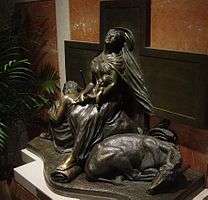 The Holy Family Resting - The Flight Into Egypt, Basilica of the National Shrine of the Immaculate Conception, Washington, D.C.
The Holy Family Resting - The Flight Into Egypt, Basilica of the National Shrine of the Immaculate Conception, Washington, D.C.
 Los Portadores de la Antorcha ("The Torch-bearers"), cast aluminum, Ciudad Universitaria, Madrid[20]
Los Portadores de la Antorcha ("The Torch-bearers"), cast aluminum, Ciudad Universitaria, Madrid[20]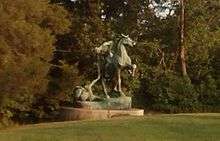 Los Portadores de la Antorcha ("The Torch-bearers"), cast bronze, Discovery Museum and Planetarium, Bridgeport, Connecticut
Los Portadores de la Antorcha ("The Torch-bearers"), cast bronze, Discovery Museum and Planetarium, Bridgeport, Connecticut
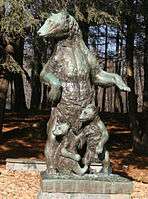 Mother Bear and Cubs, at Earthplace, Westport, Connecticut
Mother Bear and Cubs, at Earthplace, Westport, Connecticut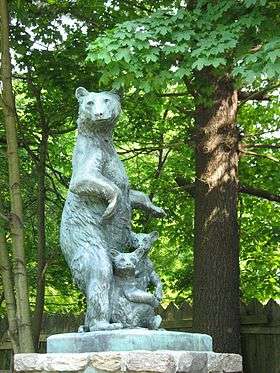 Mother Bear and Cubs, Huntington State Park, Redding, Connecticut
Mother Bear and Cubs, Huntington State Park, Redding, Connecticut Don Quixote, aluminum 1947, Brookgreen Gardens, Murrells Inlet, South Carolina
Don Quixote, aluminum 1947, Brookgreen Gardens, Murrells Inlet, South Carolina Sybil Ludington, 1961, Carmel, New York
Sybil Ludington, 1961, Carmel, New York- Smaller Sybil Ludington statue close-up, Offner museum, Brookgreen Gardens
 Sculpture of Wolves, Huntington State Park, Redding, Connecticut
Sculpture of Wolves, Huntington State Park, Redding, Connecticut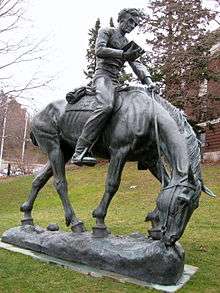 Young Abe Lincoln on Horseback, bronze 1966, on the campus of the State University of New York College of Environmental Science and Forestry, Syracuse, New York
Young Abe Lincoln on Horseback, bronze 1966, on the campus of the State University of New York College of Environmental Science and Forestry, Syracuse, New York El Cid Campeador, bronze 1923, the central sculpture at the entrance to the Hispanic Society of America, New York City
El Cid Campeador, bronze 1923, the central sculpture at the entrance to the Hispanic Society of America, New York City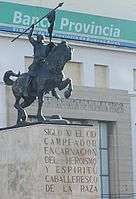
- Cid Campeador, a monument to El Cid in Seville
 Youth Conquering the Wild at The Mariners Museum in Newport News, Virginia
Youth Conquering the Wild at The Mariners Museum in Newport News, Virginia One of the Reaching Jaguar sculptures at The Mariners Museum in Newport News, Virginia
One of the Reaching Jaguar sculptures at The Mariners Museum in Newport News, Virginia General Israel Putnam statue at the entrance to Putnam Memorial State Park
General Israel Putnam statue at the entrance to Putnam Memorial State Park
See also
- Atalaya and Brookgreen Gardens, a National Historic Landmark site in South Carolina
- Berkshire Museum, Massachusetts
Notes
- ↑ "Anna Hyatt Huntington Papers". Syracuse University. Retrieved December 29, 2011.
- 1 2 From a statement by The Miriam and Ira D. Wallach Art Gallery of Columbia University, dated February 12, 2014.
- ↑ Foner, Daria Rose. "Anna Hyatt Huntington's Jaguars". Wild Things: The Blog of the Wildlife Conservation Society Archives. Wildlife Conservation Society. Retrieved 13 February 2014.
- ↑ John P. O'Neill, ed. (2001). American Sculpture in the Metropolitan Museum of Art: A catalogue of works by artists born between 1865 and 1885. The Metropolitan Museum of Art. p. 600. ISBN 0-87099-923-0.
- ↑ Anna Vaughn Hyatt Huntington at Find a Grave
- ↑ Archer Milton Huntington at Find a Grave
- ↑ "Anna Hyatt Huntington Papers An inventory of her papers at Syracuse University". Library.syr.edu. Retrieved 2013-01-14.
- ↑ Archives of American Art. "Summary of the Anna Hyatt-Huntington papers, 1902–1967 | Archives of American Art, Smithsonian Institution". Aaa.si.edu. Retrieved 2013-01-14.
- ↑ http://www.metmuseum.org/toah/hd/scul/hd_scul.htm "Heilbrunn Timeline of Art History: American Women Sculptors," Metropolitan Museum of Art. Retrieved 2014-04-28.
- ↑ Dare, Kitty. "The Hispanic Society Sculptural Program". Media Center for Art History at Columbia University. Retrieved 21 April 2013.
- ↑ "buenos aires: monumento al cid campeador | line of sight". Wrighton.com.ar. 2011-05-31. Retrieved 2013-01-14.
- ↑ "Joan/Jéanne: Multiplying a Monument" Anna Hyatt Huntington Columbia University retrieved January 4, 2017
- ↑ "J. Sanford Saltus Obituary" The Numismatist v. 35, n. 8; August 1922, p. 378 via Google Books retrieved January 4, 2017
- ↑ Illustration. Archived 2006-11-06 at the Wayback Machine.
- ↑ http://www.histden.org/journal/jhd_v55_2007_3_secured.pdf
- ↑ "The Talk of the Town: Package". The New Yorker. Retrieved 2013-01-14.
- ↑ http://www.ctpost.com/local/article/Torch-Bearers-headed-to-Houston-5100394.php
- ↑ "Visit the SC Williams Library at Stevens Institute of Technology". Stevens.edu. Retrieved 2013-01-14.
- ↑ Note: this may be a scale model of the oversize statue of the same subject at the State University of New York College of Environmental Science and Forestry, in Syracuse, New York, pictured elsewhere in this article.
- ↑ Christen, Arden G., and Joan A. Christen. 2007. "An Ethical Lesson Learned from the Equestrian Sculpture, "The Torch Bearers," at the University of Madrid Dental School," Journal of the History of Dentistry 55(3): 160-164. Accessed: March 8, 2013.
- ↑ Wright, Robert. 2011, May 31. "Buenos Aires: Monumento al Cid Campeador," Line of Sight (blog). Accessed: March 8, 2013.
References
- Armstrong, Craven, et al., 200 Years of American Sculpture, Whitney Museum of Art, New York, 1976.
- Craven, Wayne, Sculpture in America, Thomas Y. Crowell Co, New York, 1968.
- Evans, Cerinda W., Anna Hyatt Huntington, The Mariners Museum, Newport News, Virginia, 1965.
- National Sculpture Society, Contemporary American Sculpture 1929, National Sculpture Society, New York, 1929.
- Proske, Beatrice Gilman, Brookgreen Gardens Sculpture, Brookgreen Gardens, South Carolina, 1968.
- Opitz, Glenn B, Editor, Mantle Fielding’s Dictionary of American Painters, Sculptors & Engravers, Apollo Book, Poughkeepsie, New York, 1986.
- Rubenstein, Charlotte Streifer, American Women Sculptors, G.K. Hall & Co., Boston, 1990.
- Leary, Joseph, A Shared Landscape: A Guide & History of Connecticut's State Parks & Forests, Friends of Connecticut State Parks Inc., Hartford, CT, 2004.
External links
| Wikimedia Commons has media related to Anna Hyatt Huntington. |
- Anna Hyatt Huntington Papers at Syracuse University
- Oral history interview with Anna Hyatt-Huntington, (c. 1964)
- Goddess, Heroine, Beast: Anna Hyatt Huntington's New York Sculpture, 1902–1936 (exhibition), January 22 – March 15, 2014, the Miriam and Ira D. Wallach Art Gallery, Columbia University
- Brookgreen Gardens, at Murrells Inlet, South Carolina
- Anna Hyatt Huntington at Find a Grave